NJ Teachers of English to Speakers of Other Languages/
NJ Bilingual Educator
ARTICLES:
September 26, 2023
6 ESL Problems Teachers Face and How to Fix Them
By Revel Arroway
 “As teachers, we put on our professional grade (emotional) armor and we charge into the day ready to conquer the world.” However, at times, the ESL teacher might feel that the teaching is too hard because of job demands and issues in the classroom.
“As teachers, we put on our professional grade (emotional) armor and we charge into the day ready to conquer the world.” However, at times, the ESL teacher might feel that the teaching is too hard because of job demands and issues in the classroom.
In his blog, Arroway offers solutions to six common problems.
1. Lots of Hours, Little Time to Plan
- First, create lesson plans that match your teaching style. Here you can find the outline of how Arroway plans and links to other methods.
- Prepare ahead of time following these guidelines:
- What will I need in my teacher’s toolbox?
- What student/parent/administration expectations will I need to fulfill?
- What will I need to research or learn before beginning the class routine?
- What will I need in my teacher’s toolbox?
- Over-prepare so you never run out of activities even if you do not use all of them.
2. A Grab-bag of Levels
- View this issue as a challenge
- Pair students up to help each other
- List the problems students have with English and teach to one that all students have difficulty with, such as pronunciation.
- Find resources that have different levels.
3. Acting Up or Acting Out
- Set basic rules and give general positive reinforcement when they are followed.
- Make punishment match the rule that was broken. For example, if a student forgets to bring a pencil, he has to write with a crayon for five minutes before he is given a pencil. Be careful, however, not to embarrass students.
- If a student is always answering questions before others, use a game to limit answers from that student.
4. The “Method” Cramping Creativity
- If you are required to follow a method in your teaching, explore it thoroughly to understand it and then turn it into a game.
- Research the method to understand the theory behind it so you can have some flexibility in veering away from it.
- Occasionally include a fun activity once you have met the objectives of the method.
5. No English in Class – If students are not using English in class, Arroway makes these suggestions:
- Allow students to use their home languages and find the reasons why they are not speaking in English. If you can, explain concepts in your students’ language.
- Use simple tunes to sing phrases needed in the classroom.
6. …And the Parents! – be aware of cultural differences in expectations about school.
- If necessary, use the parents’ language or get an interpreter.
- Begin with positive information about the child.
- Consider the parents’ perspective, and share your concerns about the student so you can work with them to find solutions.
- Prepare what you want to say, backed up by homework and test scores.
In the end, Arroway emphasizes the need for proactive preparation to minimize these issues.
The Pros and Cons of Homework for English Language Learners
By Vinod Aithal
Aithal begins this article with a brief summary of the research about homework. Studies have found that it can help students achieve mastery of a subject if they understand its relevance. However, there are several factors to take into account when giving homework.
 If students understand the concepts, then more practice is beneficial for review. It is also possible to use difficult homework to discover what extra instruction students might need as long as they know the assignment might be challenging.
If students understand the concepts, then more practice is beneficial for review. It is also possible to use difficult homework to discover what extra instruction students might need as long as they know the assignment might be challenging.
However, homework may not be appropriate if students have a lot of other responsibilities in their lives, if they do not have the resources needed to complete the tasks, or if it is too easy or too difficult.
Aithal recommends these types of assignments:
- Review of class instruction
- Independent reading
- Journal or essay writing
- Projects about a topic of interest
- Group activities
You can read the article here.
October 3, 2023
Meet New Executive Board Members
Kathryn Tepedino – ESL Secondary Special Interest Group Representative
 I am entering my 19th year in education and have taught ESL grades K-12, middle school French, as well as ESL in a public high school in Montpellier, France. I have spent the majority of my professional journey in pursuit of best literacy practices for MLLs, especially for those who struggle at the secondary level. After earning two Master’s degrees in Second Language and Reading Education from Rutgers University, and K-12 certifications as a reading specialist, TOSD, and an Orton Gillingham specialist, I am honored and eager to assist, collaborate, and learn alongside the members of NJTESOL-NJBE. This past year, I completed my 3rd year teaching ESL and reading intervention at Morristown High School, and will be working as a full time ML reading interventionist next year. I hope to connect with fellow secondary teachers who work with students with diverse literacy and language needs, to ensure the success of our MLs.
I am entering my 19th year in education and have taught ESL grades K-12, middle school French, as well as ESL in a public high school in Montpellier, France. I have spent the majority of my professional journey in pursuit of best literacy practices for MLLs, especially for those who struggle at the secondary level. After earning two Master’s degrees in Second Language and Reading Education from Rutgers University, and K-12 certifications as a reading specialist, TOSD, and an Orton Gillingham specialist, I am honored and eager to assist, collaborate, and learn alongside the members of NJTESOL-NJBE. This past year, I completed my 3rd year teaching ESL and reading intervention at Morristown High School, and will be working as a full time ML reading interventionist next year. I hope to connect with fellow secondary teachers who work with students with diverse literacy and language needs, to ensure the success of our MLs.
Jenna Maneri – Elementary ESL K-5 Special Interest Group Representative
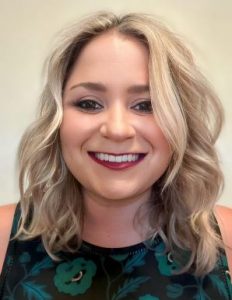 I am a Multilingual Learner Specialist with over a decade of experience as an ESL teacher in public schools in New Jersey and New York. I have dedicated my career to supporting Multilingual Learners of every grade level, from K-12 students to adult learners. My specialties include language acquisition, cultural competence, and instructional design using differentiations and scaffolding strategies. I have been an NJTESOL/NJBE member since 2013 and am very excited to be serving NJTESOL’s Executive Board as the Elementary ESL K-5 Special Interest Group Representative for the first time! I love to connect with educators who are just as passionate about educating and advocating for Multilingual Learners.
I am a Multilingual Learner Specialist with over a decade of experience as an ESL teacher in public schools in New Jersey and New York. I have dedicated my career to supporting Multilingual Learners of every grade level, from K-12 students to adult learners. My specialties include language acquisition, cultural competence, and instructional design using differentiations and scaffolding strategies. I have been an NJTESOL/NJBE member since 2013 and am very excited to be serving NJTESOL’s Executive Board as the Elementary ESL K-5 Special Interest Group Representative for the first time! I love to connect with educators who are just as passionate about educating and advocating for Multilingual Learners.
Follow me on instagram @jenna.esl so we can connect today!
Qawwee Shabazz – Liaison
 I have humbly begun to serve as the liaison for NJTESOL. My journey as an educator started after I graduated from University of South Carolina in 2008 as a Political Science major. At that time, the economy had taken a huge toll and ended my aspirations of becoming a merger and acquisitions attorney, so in 2012, I started my master’s degree at New Jersey City University in Urban Education with a specialization in English as a Second Language. Although I was successful in obtaining the knowledge for me to teach, I decided to start my professional career in Saudi Arabia at The Higher Institute of Plastic Fabrications in Riyadh in 2014. After teaching there until early 2017, I returned back to NJCU where I completed my degree in 2020 and resumed my professional career in 2019 at Jersey City Community Charter School as the ESL/ELL teacher. I really enjoy my profession educating multilingual learners, and am now getting adjusted to the position as the liaison as I hope to continue the tremendous work that the predecessor has done. I aspire to keep the relationship with our sister organization, NYTESOL, as well as the other TESOL associations within the Northeast and other states in the WIDA Consortium. Furthermore, I wish to be a part of expanding chapters in other counties such as Hudson as I witness the huge influx of MLs coming to this concentrated area. Please do not hesitate to contact me if you wish to open up a chapter for your county or become its leader. The email to contact me is at liaison@njtesol-njbe.org.
I have humbly begun to serve as the liaison for NJTESOL. My journey as an educator started after I graduated from University of South Carolina in 2008 as a Political Science major. At that time, the economy had taken a huge toll and ended my aspirations of becoming a merger and acquisitions attorney, so in 2012, I started my master’s degree at New Jersey City University in Urban Education with a specialization in English as a Second Language. Although I was successful in obtaining the knowledge for me to teach, I decided to start my professional career in Saudi Arabia at The Higher Institute of Plastic Fabrications in Riyadh in 2014. After teaching there until early 2017, I returned back to NJCU where I completed my degree in 2020 and resumed my professional career in 2019 at Jersey City Community Charter School as the ESL/ELL teacher. I really enjoy my profession educating multilingual learners, and am now getting adjusted to the position as the liaison as I hope to continue the tremendous work that the predecessor has done. I aspire to keep the relationship with our sister organization, NYTESOL, as well as the other TESOL associations within the Northeast and other states in the WIDA Consortium. Furthermore, I wish to be a part of expanding chapters in other counties such as Hudson as I witness the huge influx of MLs coming to this concentrated area. Please do not hesitate to contact me if you wish to open up a chapter for your county or become its leader. The email to contact me is at liaison@njtesol-njbe.org.
October 10, 2023
What’s In A Name? Implicit Bias of ELL First Names
By Aekatherine A. Anadiotis
 Anadiotis differentiates between explicit bias, which a person is aware of and acts on, and implicit bias, which a person is unaware of, but which can color their perception and judgment of others. Of course, as teachers of ELLs, we try to be welcoming and fair.
Anadiotis differentiates between explicit bias, which a person is aware of and acts on, and implicit bias, which a person is unaware of, but which can color their perception and judgment of others. Of course, as teachers of ELLs, we try to be welcoming and fair.
Implicit bias may become evident when a teacher struggles with a child’s first name and changes it slightly or asks for a nickname. This can make the student feel like an outsider.
The reason for this is that “a first name is a part of who we are, a unique identifier that connects us with our family, our community, and the world. ELLs quickly realize that first names hold social currency or social power. That social currency can link to acceptance by peers, how often a student is called on by teachers, and assumptions of certain behaviors. When we ask a child to alter their name, we diminish the feeling of identity that name holds for them.”
An even greater issue of implicit bias is when expectations of students’ achievements are lower because of their names. If teachers view these students as under-performing, the students may have fewer opportunities to grow.
The author offers three steps to counter our own implicit biases.
- Acknowledge that we are human and that we judge others.
- Listen for biases in ourselves when we converse one-to-one.
- Develop an asset-based mindset.
Anadiotis writes, “By addressing our own implicit biases, we can create a space where every student feels affirmed in their identity. Let’s begin with the first thing we know about our students: their first names.”
You will find the full article here.
Placing Identity at the Epicenter of Socially Just Classrooms
By Nancy Kwang Johnson & Nicole Brun-Mercer
 From the four “Social Justice Standards” the authors focus on identity and describe activities that can enhance students’ feeling of belonging through “Embracing Multiple Identities.”
From the four “Social Justice Standards” the authors focus on identity and describe activities that can enhance students’ feeling of belonging through “Embracing Multiple Identities.”
Each activity is modeled and then developed through small group and class discussions.
- Identity Mapping and Story Sharing – “Purpose: To begin guiding students through the process of exploring their intersecting identities.” This is the basis for the other activities. After introducing the topic through a story, students brainstorm together and then fill out a nine-square grid with their most important identities. They might tell a story related to one of these aspects of their identity.
- Creating an “I Am” Poem and Delivering a Poetry Slam – “Purpose: Over two lessons, to reflect on and compare how one’s self-identity differs from societal perceptions and constructions of the ‘Other’” Students bring in a picture to share with the class as they read “I am …” statements that they write about themselves.
- Double-Entry Journal Storytelling – “Purpose: To examine and relate to poem excerpts addressing the visibility, invisibility, multiplicity, and intersection of ‘Other’ identities.” After they read a poem, students choose three quotes and write how these relate to their own experiences.
- Identity-Based Poster Presentations – “Purpose: To explore the importance and personal meaning of an identity or intersecting identities.” The authors list several options that students can use as the basis for the posters that they will share with the class.
The authors conclude, “Using the target language, MLLs are empowered to tell their stories. As a result, they are forging greater connections with their classmates, affirming positive social identities, and creating a sense of belongingness.”
Here you can find the identity standards, detailed instructions for the activities, and the resources that the authors used.
October 17, 2023
October’s Member of the Month
 Mrs. Lauren Ventresca works at Morris School District in Morris County. She is committed to her profession as well as the multilingual community. She has been pursuing her masters while collaborating and supporting her learning community with various activities, such as the Summer ELL Academy, After School Programs, and more. Mrs. Ventresca uses an asset-based approach to multilingualism with her students as well as her community. She also implements collaborative practices in the Science and ESL classrooms. Finally, Mrs. Ventresca shared her skills and experience as a presenter at the 2023 NJTESOL/NJBE Spring conference.
Mrs. Lauren Ventresca works at Morris School District in Morris County. She is committed to her profession as well as the multilingual community. She has been pursuing her masters while collaborating and supporting her learning community with various activities, such as the Summer ELL Academy, After School Programs, and more. Mrs. Ventresca uses an asset-based approach to multilingualism with her students as well as her community. She also implements collaborative practices in the Science and ESL classrooms. Finally, Mrs. Ventresca shared her skills and experience as a presenter at the 2023 NJTESOL/NJBE Spring conference.
Do you also know someone who deserves to be Member of the Month? Nominations are being accepted. Self-nominations are also accepted!
Meet More New NJTESOL/NJBE Executive Board Members
 Mary Mansfield – Representative-at-Large
Mary Mansfield – Representative-at-Large
I’ve been serving our organization for the past several years as the Burlington County Consortium chapter leader and am excited to add Rep-at-Large to my responsibilities. I am currently the elementary ESL teacher at Medford Township Public Schools in southern New Jersey. As a 20+ year teacher serving in these two positions helps me support fellow ML teachers. I completed my teaching certification at Rutgers University and received a M. Ed. in Teaching English Language Learners from American College of Education. I’m looking forward to supporting NJEA by bringing NJTESOL/NJBE’s passion for supporting ML teachers with professional development opportunities in the near future.
 kiina dordoni – Social Media Coordinator
kiina dordoni – Social Media Coordinator
I am super excited to join NJTESOL/NJBE’s Executive Board as the Social Media Coordinator and look forward to working with such a knowledgeable and passionate group of educators! I am currently working full-time as an Education Consultant doing what I absolutely love to do best – facilitating high quality professional development and coaching through a culturally responsive and social justice lens that will ultimately benefit our multilingual and multicultural learners while pursuing my doctorate in Urban Education Leadership at Teachers College Columbia University.
I was an administrator for six years in the Morris School District in Morristown, NJ – first, as an assistant principal in the high school where I co-constructed our Newcomer Program for students with limited or interrupted formal education (SLIFE), and then, as the Director of ELL/Bilingual Programs for the entire district that serves 1,300+ Multilingual Learners (MLs).
I entered the education profession as a Teach for America corps member in 2008 after serving for six years in the United States Navy and taught Spanish, Social Studies, and Bilingual Language Arts to students from grades K-12 for 10 years prior to becoming an administrator. I hold a BA in Spanish and International Studies, an MA in Bilingual/Bicultural Education, and an MA in Educational Leadership.
 Kathleen Bowman – Bilingual Elementary 1-5 Representative
Kathleen Bowman – Bilingual Elementary 1-5 Representative
For the past 20 years, I have been a Bilingual Education and ESL teacher who is dedicated to serving Multilingual Learners and their families. I am passionate about bilingualism, bilingual education and the pursuit of avenues that facilitate more equitable access to educational opportunities for multilingual learners. Among the most cherished facets of my vocation is my dedication to engaging the families of my multilingual students in their education and striving to empower them to assume participative roles within their communities.
I aim to champion the cause of each and every student, sparing no effort to ensure they receive the personalized attention and resources they require to thrive. I possess a Bachelor of Arts in Education from the Army Polytechnic School in Ecuador and a Masters of Language Education with an Endorsement in Bilingual Education and ESL from Rutgers University. I have dedicated myself to continuous professional development, participating in numerous programs encompassing trauma, trauma informed teaching, the Nurtured Heart Approach, and Social Emotional Learning. I enjoy sharing what I have learned with her fellow educators through the creation of presentations and resources which enable them to better serve students hailing from linguistically diverse backgrounds.
October 24, 2023
Meet Two More New Executive Board Members
Aphrodite Dellaporta, M.Ed., LDT-C, Special Education SIG Representative
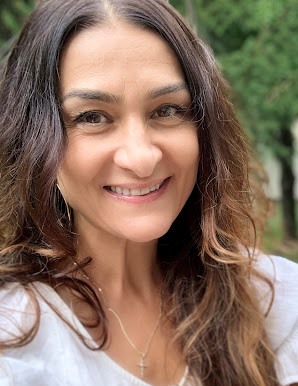 I have had the privilege of being a chair member of the NJTESOL/NJBE Camden/Gloucester Chapter since 2015 and have actively participated in the spring conferences throughout my teaching career.
I have had the privilege of being a chair member of the NJTESOL/NJBE Camden/Gloucester Chapter since 2015 and have actively participated in the spring conferences throughout my teaching career.
My journey into the world where ESL and special education intersect began 13 years ago when I began teaching MLs at Pyne Poynt Middle School in the Camden City School District. A significant portion of my MLs were also students with special needs. My students ignited my desire to pursue a Master’s in Teacher Leadership at Rowan University with a focus on Special Education.
During my time at Magnolia Public School, I had the rewarding opportunity to serve as a mentor, special education and ESL teacher, and ESL program coordinator. Alongside administration and my colleagues, we dedicated ourselves to establishing effective inclusive practices. In 2021, Magnolia received the NJCIE Honors Award in recognition of our commitment to building and sustaining a supportive, inclusive learning community for all our students, during which time I was recognized by my superintendent. It was a transformative experience for me as an educator, for which I remain grateful.
Currently, I serve as an ESL teacher at Park Avenue Elementary School in the beautifully diverse Freehold Borough School District. Advocating for doubly exceptional MLs has continued to drive my passion, and this summer marked the achievement of my Learning Disabilities Teacher Consultant certification.
As the Special Education SIG representative, I am wholeheartedly dedicated to supporting NJTESOL/NJBE members and championing the cause of MLs with learning disabilities, ensuring the implementation of best practices in their education. I am very much looking forward to sharing this meaningful journey with all of you.
Dr. Nurka Nieves – Family/Community Action Representative
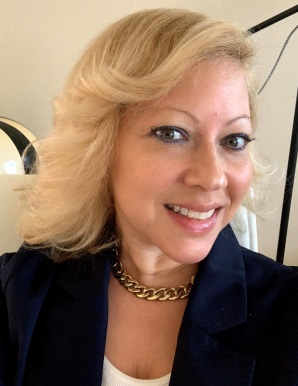 My first teaching role was to middle school-aged multilingual learners in a large urban school district in New Jersey. That experience cemented my career as an educator and unveiled my passion to advocate and support pedagogy that empowers underrepresented individuals.
My first teaching role was to middle school-aged multilingual learners in a large urban school district in New Jersey. That experience cemented my career as an educator and unveiled my passion to advocate and support pedagogy that empowers underrepresented individuals.
I have experience teaching and leading programs for multilingual learners in all grade bands K-12 in charter, urban, and suburban school districts across New Jersey.
In 2016, I completed a Doctor of Education Leadership, Management & Policy from Seton Hall University. My doctoral journey at Seton Hall University began in 2005 when I was awarded a National Fellowship towards an Education Specialist degree in Bilingual/Bicultural Studies.
In addition, I have coordinated efforts in Early Childhood and Family Studies, Bilingual/Bicultural & ESL/ESOL at Kean University and The University of Tampa to create highly qualified educators who share a love of teaching and becoming role models for the students they teach. This experience culminated with supervising future teachers while they completed their clinical practices in the field.
I prepared and delivered lectures to undergraduate and graduate students on topics such as applied linguistics, the science of reading, culturally responsive teaching, race and identity, equity, and justice.
Some of these courses include Bilingual Multicultural Education in American Schools, The Bilingual Child in American Society, Developing Language and Readiness Skills in a Bilingual Setting, Teaching Content Areas in Bilingual/Multicultural Schools, ESOL Foundations, Curriculum Development for Young Children, and Family & Community Partnerships.
I desire to promote an enriching, engaging, and nurturing environment rooted in equity, inclusion, and belonging for culturally responsive teaching. In addition to ensuring academic, cognitive, linguistic, and socioemotional support that meets the needs of multilingual learners. This is why being an active member of NJTESOL-NJBE’s Advocacy Subcommittee is important to me.
My goals include developing actionable steps to hear families’ voices by validating and affirming cultural beliefs and languages so that all individuals are seen, heard, and honored through the concerted efforts of servant leadership.
October 31, 2023
Statement on International War
NJTESOL/NJBE deplores the idea of war and condemns those who perpetuate it for their own gain. We believe in peace and support the victims of violence in all lands. Conflicts between nations due to terrorism, territorial conflict, or racial hatred impact us all; there are humanitarian crises around the world where, inevitably, the losers are children, women, the aged, and the infirm.
As educators of Multilingual Learners, we see the impact of war and strife in our classrooms. Children and their families arrive with little but personal trauma, and we are called to teach these uprooted students. NJTESOL/NJBE and other organizations around the state of NJ can provide support for educators, but the school teachers and administrators are the first line of contact. We recognize your impact and the additional burden it is to teach these innocent victims, and we know you will answer that call.
NJTESOL/NJBE firmly supports the end to all violence and the return of hostages, along with the hope for humanitarian aid, security, and peace for all those who are suffering.
Perspectives from Ukraine
Earlier this semester, I asked my high level college ESL writing class to write an essay about a life lesson. Most of my students wrote about the usual topics, but the essays from two of my Ukrainian students, who are both a little older, expressed insights into their world. I asked them for permission to share their work with you. (with minor grammatical edits) –Marilyn Pongracz
Life Lesson
By Volodymyr Krutii
 Our lives are filled with lessons that help us to understand ourselves, the world around us, and often prompt us to rethink our lives. I want to share the most significant lesson I’ve learned in my life, which began on the 24th of February in the early morning when I heard the sound of bombs exploding. This horrific morning, which changed not only my life but the lives of millions of Ukrainian people, has taught me the most profound lesson.
Our lives are filled with lessons that help us to understand ourselves, the world around us, and often prompt us to rethink our lives. I want to share the most significant lesson I’ve learned in my life, which began on the 24th of February in the early morning when I heard the sound of bombs exploding. This horrific morning, which changed not only my life but the lives of millions of Ukrainian people, has taught me the most profound lesson.
I realized that life is too short, and I need to cherish every day and every minute. I understood that I should spend more time with my loved ones and think less about material possessions because today, you may have it all, but tomorrow, you could have nothing. This lesson has taught me to live in the present, to love myself, my life, my family, my country, and our precious freedom more because these are the greatest gifts in our lives. I wish every person could understand these simple truths. It will help them to appreciate what they have now.
This is why the war in my homeland, Ukraine, has become the most terrible lesson that has changed me, my life, my destiny, and my perspective.
Life Lesson
By Oryslava Tsaruk
 A long time ago I read a historical novel. It was written by Ivan Franco, a brilliant Ukrainian writer. The essay describes the struggle of the Ukrainian people against the aggressor. The lesson I learned from the author is that the strength of people is in their unity. I see it as especially valuable now, when my people are again fighting for their existence. In fact, there are three main reasons why unity is so important: emotional support, resilience and cooperation.
A long time ago I read a historical novel. It was written by Ivan Franco, a brilliant Ukrainian writer. The essay describes the struggle of the Ukrainian people against the aggressor. The lesson I learned from the author is that the strength of people is in their unity. I see it as especially valuable now, when my people are again fighting for their existence. In fact, there are three main reasons why unity is so important: emotional support, resilience and cooperation.
One reason why unity is important is emotional support. When in a small group of people such as family, you can feel unity and understanding, it is very helpful. Family can provide support when you have a difficult time. Sometimes a person needs just another person around to feel better.
A second reason why unity is important is resilience in the face of difficulties. It is so important to provide support to one another even in the most terrible situations. My home country is an example of resilience now. They are united with one goal, to win and to end the war. It touches me how people hold themselves together and fight.
Finally, unity encourages cooperation. It can be a team or class work, but when people cooperate, they can get what they want faster. Also, if nations are united they can solve a global problem such as climate change or international conflicts. Unity means cooperation and it is critically important.
Learning this life lesson of the importance of unity can provide emotional support, resilience and understanding that is necessary for cooperation. Why do I think unity is so important? Even in the most difficult situations, such as war, when people are facing complete destruction and even death, the unity of people can save them.
Marilyn Pongracz is the ESL Tutoring Supervisor at Bergen Community College and the NJTESOL/NJBE Technology Coordinator.
November 7, 2023
Identifying Equitable Intervention for MLLs
By Essie Sutton
 In “Identifying Equitable Intervention for MLLs”, Essie Sutton describes a holistic district-wide system for supporting MLs who are struggling with academics or with social-emotional learning. This integrated system would make it easier to identify if the challenges these MLs are facing are language based or have some other cause. The result will be an education that meets the needs of these students.
In “Identifying Equitable Intervention for MLLs”, Essie Sutton describes a holistic district-wide system for supporting MLs who are struggling with academics or with social-emotional learning. This integrated system would make it easier to identify if the challenges these MLs are facing are language based or have some other cause. The result will be an education that meets the needs of these students.
These multi-tiered systems of support (MTSS) involve “four core components: screening, progress monitoring, a multilevel prevention system, and data-based decision-making.” The three levels of support are:
- A curriculum that meets the needs of all students
- Small group intervention
- Individualized intervention.
Sutton also lists Four Key Components of a Culturally and Linguistically Responsive MTSS:
- Use of a culturally and linguistically responsive curriculum
- Provide ESL support across all levels of instruction
- Use data to drive decision-making
- Support collaboration across multiple stakeholders
The author proposes that this is all possible because there is technology that can make it easy to collect the needed data and share it with all of the stakeholders.
Here you can find the details about how to implement this support system.
Serving English Learners with Disabilities: How ESL/Bilingual Specialists Can Collaborate for Student Success
By Dr. Phyllis Robertson
 In this article, Dr. Phyllis Robertson provides both the rationale and the processes for implementation of a collaborative effort to support multilingual learners who may need special services.
In this article, Dr. Phyllis Robertson provides both the rationale and the processes for implementation of a collaborative effort to support multilingual learners who may need special services.
The need for collaboration is evident because each stakeholder has essential knowledge to help the student. The ESL or bilingual teacher is primary in the team but may have limited knowledge of interventions for students with disabilities. The special education teacher may not be familiar with ESL strategies, and the classroom teacher knows general instruction strategies but likely has less experience with both of these types of students.
Robertson lists the following guidelines for effective collaboration. These focus on the ESL teacher, but they apply to all educators.
- Build Partnerships with Families – Value them, support them, and get input from them.
- Learn from One Another – Share knowledge, resources, strategies, and responsibilities with all stakeholders including administrators.
- Establish a Structure for Collaboration and Evaluate the Results of Your Efforts – This includes planning, communicating with each other, keeping records, and sharing successes.
- Use Collaboration to Develop Appropriate IEPs for ELs with Disabilities – Involve the family members in the assessments from bilingual/ESL teachers, general educators, and special educators to develop goals and strategies for instruction and monitoring progress.
Although it may be difficult to implement, the result is that “working collaboratively has the potential to reduce isolation and increase the effectiveness of all educators, and it can make our work more interesting, rewarding and fun.”
Here is the full article and a short video on the topic.
November 14, 2023
November’s Member of the Month
 Congratulations to November’s Member of the Month, Ms. Francesca Dasilva from the Trenton Public School District.
Congratulations to November’s Member of the Month, Ms. Francesca Dasilva from the Trenton Public School District.
Ms. Dasilva has not been a teacher for a long time, but her nominating co-worker Pauline Saravia described her as amazing. Ms. Dasilva uses colorful bilingual charts, multiple scaffolds such as sentence frames and resources in Google Classroom, etc. It is evident that Ms. Dasilva puts in a lot of additional time to support her students. She attended the NJTESOL/NJBE 2023 conference this year and is always looking for professional development to support her students. Thank you Ms. Dasilva for all that you do for your students!
Do you also know someone who deserves to be Member of the Month? Nominations are being accepted. Self-nominations are also accepted!
Thanksgiving and Immigrant Cultures
By Corey Heller
 As the holidays approach, and Thanksgiving is around the corner, you can find numerous resources appropriate for your MLs in Larry Ferlazzo’s lists of “The Best Sites To Teach and Learn About Thanksgiving“. This updated list features lessons, activities, games, slideshows, movie clips, and a music video.
As the holidays approach, and Thanksgiving is around the corner, you can find numerous resources appropriate for your MLs in Larry Ferlazzo’s lists of “The Best Sites To Teach and Learn About Thanksgiving“. This updated list features lessons, activities, games, slideshows, movie clips, and a music video.
One of these sites offers ideas about how to link the holiday to your students’ own immigration experiences. Thanksgiving and Immigrant Cultures by Corey Heller begins with background for teachers followed by five optional discussions for the classroom.
These are:
- Being thankful: The irony of how something we can be thankful for was actually negative for others.
- Showing appreciation despite cultural differences: A lesson that focuses on misunderstandings because of the ways different cultures express appreciation and affection.
- The early settlers: A map lesson about what countries immigrants have come from since the 1600’s until now.
- Reasons for immigration: Why the first settlers came to America, and why your students’ families immigrated.
- The search for a better life: Expectations in contrast with reality for the early settlers and the positive aspects and challenges your students’ families have faced in immigrating.
According to Heller, “the ultimate goal is to help all children realize how much they have to be thankful for.”
See below for a Thanksgiving challenge.
Rethinking Thanksgiving: Myths & Misgivings
By Vera Stenhouse
 This article is also from Ferlazzo’s list.
This article is also from Ferlazzo’s list.
As a teacher-educator, Stenhouse describes the challenge she presented to student teachers about the traditional story of Thanksgiving. Not only is the story inaccurate, but it also omits the settlers’ thievery and the diseases they carried that destroyed many Native American villages.
Stenhouse first asked her student teachers what they knew about the holiday and then had them do research to discover the facts about what really occurred. From this, she encouraged them to change the narrative about the holiday.
She stated her goal as: “Confronting racism, injustice, prejudice, and stereotypes through a consciousness-raising education is a far cry from the fun-filled, feel-good activities characteristic of how schools approach holidays. With respect to indigenous peoples, I want my students to acknowledge the diverse and unique traditions among Native American cultures and to explore the historic and contemporary legacy of colonial intrusion, brutality, and cultural ignorance. As a teacher educator, I seek to invite my students on a journey of interrogating the fallacy of the ‘standard’ curriculum as neutral and push them to develop an understanding of official knowledge as politically constructed and contestable. Critiquing received facts, such as the first Thanksgiving, is an integral piece of an overall critical approach to teaching and learning. I want my students to recognize that the histories of indigenous peoples have been subverted, silenced, and misrepresented in the curriculum. Equally important: I want my students to recognize that we can do something about it.”
Find your own challenge by reading the article.
Note: Although the links in the article don’t work, the information is searchable.
November 21, 2023
Thank You Notes from Elementary School Students
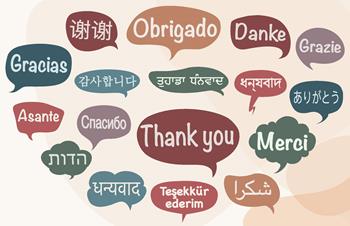 From: We Are Teachers
From: We Are Teachers
“Dear Mrs. Olson,
You are an awesome teacher. When you teach, it feels like I’m not learning anything, but once you get done teaching, I realize I have learned something! You are a better teacher than you think.”
“I read my first book all by myself, thank you”
“Dear Mrs. Smith,
U are the best teacher ever! Whenever I am sad U make my day shine. U light me up inside like the forth of July!!! I love you very much.“
“Dear Ms. Berquest
Thank you for teaching this year my favorite thing I did this year was spending time with you.”
“Dear Mrs. Suarez,
You are so Nice, Cool, and Educational! I think that it is so cool that you speak Spanish. Thank you for all you do.
From,
Maya”
Thank You Notes from Middle and High School Students
 “Dear Mrs. Howell,
“Dear Mrs. Howell,
I would like to thank you for everything you did for me in middle school. The way you shaped me as a student in a younger age is what makes me successful today. Even after graduation I will still remember you as one of the most influential people of my high school career.
thank you.”
“Good morning, Mrs. Stetzar,
It’s been a really long time & you had so many students I’m not sure you would even remember me. However you were the reason I felt safe at school when I actually showed up before I was home bound. I had a period with you daily, we would sit together in the hallway bc of my anxiety and depression. I just want you to know you are the only reason I made it as far as I did in 9th grade. Thank you.”
“Mr. Green,
I want to thank you for Everything you have taught me, I know I could have been a knucklehead at some points in your classroom when I would do wrong, but you would get on me for the better and believe me your lectures did put a affect on me. Thank you for believing me to do better for my future, and also thank you for caring when no other teacher didn’t.
John”
“Thank you for being a really cool English teacher and always being interested in other cultures! You’ve made me feel more comfortable and open to share things about my Chinese culture after all of the hate crimes towards asians. Moreover, you’ve helped me improve my writing skills and made ELA my favorite subject due to your personality and how fun you make the subject! When you compliment me on my handwriting you make me really happy since I’m not satisfied with it and also how it does look kind of messy.
Have a good day!”
You can find these and more on We Are Teachers.
November 28, 2023
An AI To-Do List for Educators
By Paul Beckermann
 Beckermann encourages educators to work with AI in teaching and explains how it can be manageable using these five steps.
Beckermann encourages educators to work with AI in teaching and explains how it can be manageable using these five steps.
- Learn about AI. Set up a free account in one of the chatbots and try it out. Brainstorm ideas by asking the chatbot questions and follow-up questions to help you find something you can use.
- Engage in the conversation. Have conversations in meetings and professional development sessions to discover answers to the following questions:
- What do you need to learn about AI, and how can you gain that knowledge?
- What potential benefits and challenges might AI present to teaching and learning?
- How might you need to modify current practices because of AI?
- How can you leverage AI to improve teaching and learning?
- How can you empower your students for success in an AI world?
- Teach students about it. Beckermann lists three websites that have activities, projects, and challenges for students.
- Help students develop workforce skills. These include analytical and creative thinking, flexibility, motivation, and technological ability through authentic problem solving.
- Engage students in using AI. Give students opportunities to use AI with guidance and limitations. Together with your students, Beckerman predicts that both you and they can work together to learn how to leverage these tools.
Outsmart ChatGPT: 8 Tips for Creating Assignments It Can’t Do
By Alyson Klein
 In this article, Klein addresses the issue of students using ChatGPT to cheat. She lists eight possible “AI-proofing assignments.”
In this article, Klein addresses the issue of students using ChatGPT to cheat. She lists eight possible “AI-proofing assignments.”
- Ask students to write about something deeply personal. Students like to share their own stories although this may limit some critical thinking.
- Center a writing assignment around an issue specific to the local community. To make this more rigorous, it could be related to a global issue.
- Direct students to write about a very recent news event. The app is likely to generate fictional information for anything in the news after September 2021, but this may change soon.
- Have students show or explain their work. Have students describe how they completed their assignment.
- Ask students to give an oral presentation, along with the written work. They might also record themselves.
- Return to a pre-digital age and ask students to handwrite their essays in class. This could also allow for peer feedback.
- Put project-based learning to work. Klein recommends “big, multi-disciplinary projects”.
- Run the assignment through ChatGPT before giving it to students. The app can answer questions if given the sources.
December 5, 2023
Invitation to Write an Article for the Yearly Voices Journal
 As we reflect at the end of the year, it is good to look back and think about our successful teaching practices, collaborations, research findings; and other areas of success. Self-reflection is a useful tool, but sharing these successes is a gift we can give to our colleagues.
As we reflect at the end of the year, it is good to look back and think about our successful teaching practices, collaborations, research findings; and other areas of success. Self-reflection is a useful tool, but sharing these successes is a gift we can give to our colleagues.
A great way to share that information is to write an article for the NJTESOL/NJBE Voices Journal, our annual winter publication. We are looking for articles from our members before the submission deadline of January 15. To promote all voices in our organization we encourage articles from Black, Indigenous, and people of color (BIPOC) members and/or topics that focus on race and power within language instruction, or linguistic justice more broadly. Submission guidelines indicate articles in these categories:
- Current issues: a submission for the current issues category should provide a clear analysis, critique, discussion, or presentation of key topics in New Jersey ESL, Bilingual Education, and Dual Language programs.
- Classroom explorations: a submission for the classroom explorations category will enable teachers to share their personal perspectives on their own instructional techniques, challenges, issues, and successes. It should include viewpoints in developing multiple avenues to address the range of issues in ESL, Bilingual Education, Dual Language education, and student learning. Each submission should include the type of program, the instructional techniques, and an overview in the first paragraph, then provide supporting evidence throughout the rest of the article.
- Program descriptions/exemplary scheduling: a submission for this category will detail a school or district program that has created a solution to an issue impacting effective instructional settings for English language learners, bilingual students, and dual language learners. These programs do not need to be all-encompassing but rather provide insight into creative strategies for scheduling and/or lesson planning to enhance student learning.
- Alternative perspectives: a submission in this category will provide an opportunity for diverse perspectives on one issue or topic. We encourage innovative commentary on issues or teaching methodologies as a way of including all voices in a professional conversation.
Articles must be current and appropriate as related to the teaching of English to speakers of other languages, Bilingual Education, and Dual language programs including students who are U.S.-born bilinguals, ethnically and/or racially diverse multilingual speakers, “generation 1.5”, immigrants, and international students. Articles may focus on any educational level, from kindergarten to university/teacher education, as well as on adult school and workplace literacy settings. Article length is recommended to be 500-1200 words and photos are accepted. In recognition of the disproportionate impacts upon Black multilingual language learners, we encourage submissions at the intersection of race and language. Please check the complete guidelines here.
NJTESOL/NJBE thrives on the scholarship and teaching skills of its members. Please take the time to share some of your expertise with your colleagues in the NJTESOL/NJBE Voices Annual Journal. The deadline for submission is January 15, 2024. Click here for submission information.
Thank you,
Kathleen Fernandez, Executive Director NJTESOL/NJBE
Parent Expo
Teachers have your students’ families register for this important event!
NJTESOL/NJBE Virtual Parent Expo 4 – Padres con Poder/Parent Power
 Parent Expo Saturday, January 20, 2024, 9:30-12:00.
Parent Expo Saturday, January 20, 2024, 9:30-12:00.
Parents of Multilingual Learners join us for Padres con Poder/Parent Power, NJTESOL/NJBE’s FREE Virtual workshop on Saturday, January 20, from 9:30 – 12:30! There will be live presentations, recordings, and an online library of resources available. Topics will include student and family support with school issues, how to support students’ learning, Preschool information for families, and a presentation by Seal of Biliteracy graduates.
Gift card drawing and certificates for participants. Register on Eventbrite
Parent Expo Sábado, 20 de enero de 2024, 9:30-12:00.
¡Los padres de estudiantes multilingües se unen a nosotros para Padres con Poder/Parent Power, el taller virtual GRATUITO de NJTESOL/NJBE el sábado 20 de enero, de 9:30 a 12:30! Habrá presentaciones en vivo, grabaciones y una biblioteca en línea de recursos disponibles. Los temas incluirán apoyo a estudiantes y familias con problemas escolares, cómo apoyar el aprendizaje de los estudiantes, información preescolar para familias y una presentación de los graduados del Sello de Bilingüe.
Sorteo de tarjetas de regalo y certificados para los participantes. Regístrese en Eventbrite
Here’s the flier to share.
December 12, 2023
Ideas for English Language Learners: Celebrate the Holidays
By Larry Ferlazzo
from the The Learning Network – Teaching and Learning With The New York Times
 Larry Ferlazzo shares four language building activities in this archived blog.
Larry Ferlazzo shares four language building activities in this archived blog.
The first is writing about holiday objects. After viewing a video, students write a list of objects associated with holidays that they celebrate. Then they choose three and make a quick drawing of each one. After that, they write a paragraph about each one. Ferlazzo provides sentence frames for this. Students then make final versions with the pictures and paragraphs on the same page. They can post these online, and/or continue with a speaking activity in which they share what they have written with their classmates in a speed-dating format.
A second activity involves origami; first sharing a slideshow of how to make a simple project, doing it as a class, and then having the students write the steps they took to complete the project. Students might repeat this process with a holiday-designed origami that could be given as a gift.
A third option begins with a list of sentences or short paragraphs related to New Year’s celebrations. Students read these and then group them, giving explanations for the rationale behind their classifications. They can search for additional information about their categories and write about them.
The final activity begins with making New Year’s resolutions. These are specific and short-range such as the number of pages they hope to read each week.
You can find detailed instructions and links to the videos here.
Holiday Lesson Plans from Dave’s ESL Cafe
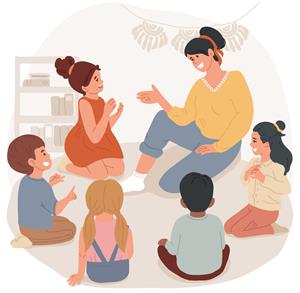 This page on dave’s ESL Cafe website has links to a variety of activities for students of all levels contributed by teachers from around the world. Although many are focused on Christmas, they can be adapted for whatever holidays your students celebrate.
This page on dave’s ESL Cafe website has links to a variety of activities for students of all levels contributed by teachers from around the world. Although many are focused on Christmas, they can be adapted for whatever holidays your students celebrate.
Germany – Holidays: Christmas Free-Style Storytelling by Jane O’Brien
Here is a no prep idea that begins with students brainstorming holiday and non-holiday nouns and verbs which the teacher writes on cards. The cards are shuffled and the students sit in a circle. The teacher begins a story in the present or past tense using the first noun and verb cards. Then each student in turn takes a noun and a verb card and continues the story until all the cards have been used.
Taiwan – Holidays: Christmas Game Idea by Prentice Berge
Each student in the class is given five strips of paper. They write their name on one side and on the other, a gift they want, one they have received, one they gave their mother, another for someone they love, and one from their parents.
The papers are all crumpled and put in a pile. The students are paired and each pair picks a paper from someone else in the class. They record their guess of who the gift might be for on a chart. Once all of the papers have been taken, the students check their answers with the students whose names are on the strips. The pair with the most correct answers wins.
Chicago – Holidays: Christmas, etc. by Cris Heredia
This activity requires a prepared set of index cards. A holiday vocabulary word is written on and underlined on each card. Two words that are related to it are also on the card. Each student tries to get their classmates to guess the underlined word without using any of the words on the card.
December 19, 2023
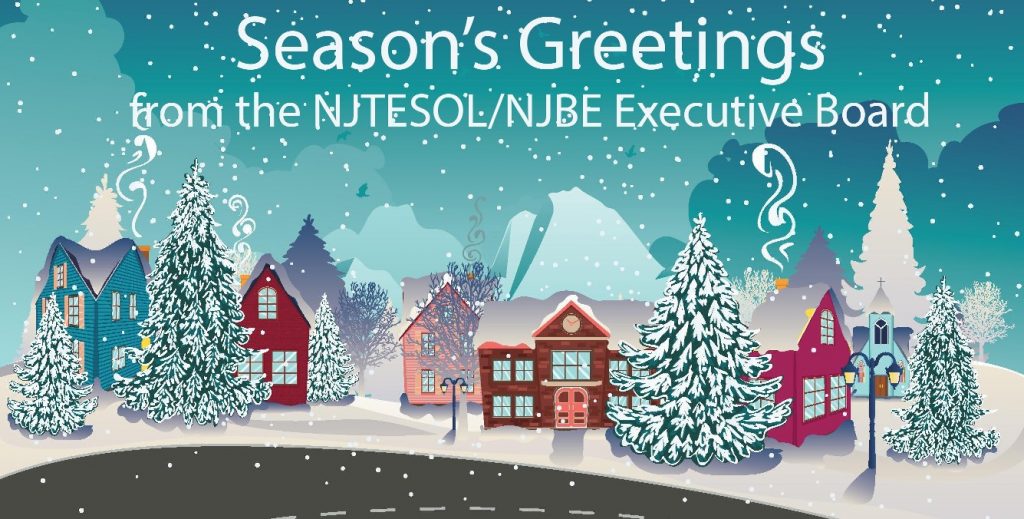
Wishing you and yours a restful holiday break
and a happy, healthy new year
NJTESOL/NJBE Weekly Voices will resume January 2, 2023.
Elected Officers
- Michelle Land, President
- LeighAnn Matthews, Vice President/President-Elect
- Margaret Churchill, Past-President
- Maria Cecilia Vila Chave, Secretary
- Maria Jaume, Treasurer (Appointed)
- Abdul-Qawwee Shabazz, Liaison
Presidential Appointees
- Sonya Bertini, Socio-political Representative
- Mary Callirgos, Graduate Student Representative
- Parent Representative – Open Position
- Joan Pujol, Membership Chair
- Historian – Open Position
- kiina dordoni, Social Media Coordinator
Contractors
- Kathleen Fernandez, Executive Director
- Gwen Franks, Business Administrator
- Marilyn Pongracz, Technology Coordinator
- Caia Schlessinger, Conference Coordinator
- Tina Kern, Exhibitor Liaison
- Dale Egan, Technology Assistant
Elected Representative
- Mary Mansfield, Representative-at-large
Special Interest Group Representatives
- Bilingual/ESL Early childhood / Pre-K -K – Open Position
- Kathleen Bowman, Bilingual Elementary 1-5
- Jenna Maneri, ESL Elementary 1-5
- Luigina Finneran, Bilingual/ESL Middle School 6-8
- Andrea Fontenez, Bilingual Secondary
- Kathryn Tepedino, ESL Secondary
- Leah Carmona, Higher Education
- Alex Guzman, Teacher Education
- Adult Education Representative – Open Position
- Aphrodite Dellaporta, Special Education
- Laura Arredondo, Supervisors
- Nurka Nieves, Family/Community Action
Committees
- Advocacy Sub-Committee, Chair: Sonya Bertini
- Professional Development Committee, Chair: Maria Cecilia Vila Chave
- Countering Anti-Black Racism Committee, Chair: kiina dordoni
- Parent Expo, Chair: Kathleen Fernandez
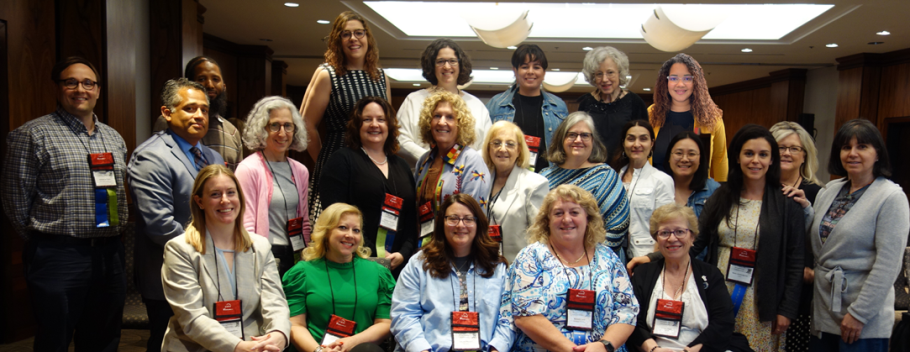 Current, Incoming, and Outgoing Board Members, May 2023
Current, Incoming, and Outgoing Board Members, May 2023
See the website for contact information.
Announcements from Fall 2023
Do you want in-person professional development? Come join the Bergen County Chapter on September 28, 2023 at Memorial Middle School Media Center located at 12-00 1st Street in Fair Lawn, New Jersey from 4:30-5:30 PM. Parking is available in the back parking lot. Margaret Churchill and Hana Prashker will be presenting information on implementing the 2020 WIDA Standards. Invite your content area colleagues and administrators as well. Everyone is welcome.
Burlington County Chapter meeting – Let’s Get the School Year Started!
This meeting focuses on networking with our Burlington County ESL colleagues and ensuring our ESL programs are off to a great start. Additionally, here are several key changes mandated by the New Jersey Department of Education. We will discuss these new requirements and help you make sure your district is in compliance. Come join us and bring your questions on October 3rd, 2023 @ 4:30 pm.
We are looking forward to seeing you! Register here to get the zoom link.
You’re invited to the Passaic County Chapter Virtual Meeting, Oct. 19, 4:30pm – 5:30pm
“WIDA ACCESS Accommodations” You can use this link to register.
You can view past topics on our YouTube channel – Follow us on Instagram!
Join us for the NJTESOL/NJBE 2023-2024 PLC Series: Teaching Bilingual Students Bilingually. PLCs will meet in the Fall, Winter, and Spring to build community among bilingual educators & discuss program types, language frameworks, lesson/unit development, and so much more!
Our first session is Saturday, October 28 from 10:00 – 11:30. Register here.
Atlantic-Cape May Chapter Meeting, Tuesday, November 14, 5:00 p.m.
Nizam’s Mediterranean Cuisine, 6725 Black Horse Pike, EHT, 08234, In BOSCOVs Shopping Center
Topic: How Diverse Experiences shape, learning Cognitive Outcomes – Lexia Workshop Report, Presenter: Linda Meranus
Cultural Heritage Event: Garba Dances & Indian Festival Time… We are celebrating with Indian food.
You will receive a 1 hour PD certificate for your attendance. RSVP to: Linda Meranus
** Please share this information with all new ESL teachers as well as providing us with their contact information for future reference.
Somerset-Hunterdon County Chapter, First meeting – Wednesday, November 15, 4:30-5:30pm via Zoom! We will discuss how to help MLs in Content Area classes and how to collaborate with Gen. Ed. Teachers in various grades. Please register using our Eventbrite link HERE!
We will send a Zoom link as the date approaches. We look forward to connecting with you and seeing you soon! Genevieve Acrin and Soyoun Ouh
Burlington ESL Consortium – Come join us on November 16th @ 4:30 pm.
Implementing the 2020 WIDA Standards Framework The 2020 WIDA Standards are finally in effect! But what are they and how do we implement them in our teaching? Join our November meeting where Maggie Churchill, past president of NJTESOL/NJBE, will present the changes.
We are looking forward to learning about the Standards together! Register here to get the Zoom link.
You’re invited to the Passaic County Chapter Virtual Meeting, Nov. 16, 4:30pm – 5:30pm
Bilingual Education Best Practices You can use this link to register.
You’re invited to the Passaic County Chapter Virtual Meeting, Dec. 14, 4:30pm – 5:30pm
AI Tools for Educators You can use this link to register.
You can view past topics on our YouTube channel. – Follow us on Instagram!
Share your successes with other members by writing an article for the annual Voices Journal!
Topics include:
- Current issues
- Classroom explorations
- Program descriptions/exemplary scheduling
- Alternative perspectives
Here are the guidelines. You can read previous issues here.
Submissions are due January 15th for publication in early March.
Parents of Multilingual Learners join us for Padres con Poder/Parent Power, NJTESOL/NJBE’s FREE Virtual workshop on Saturday, January 20, from 9:30 – 12:30! There will be live presentations, recordings, and an online library of resources available. Topics will include student and family support with school issues, how to support students’ learning, Preschool information for families, and a presentation by Seal of Biliteracy graduates. Click here to register.
2024 Spring Conference – Systems of Support for Multilingual Learners
You can attend in person at the Hyatt, New Brunswick May 29, 30, & 31
OR watch the Video Library Workshops June 3 – Sept. 2.
Share what works for you by submitting a Call for Workshop Proposal.
Beat the deadline by Registering Early!
Nominate the member of the month!
NJTESOL/NJBE has so many amazing teachers throughout our state that it would be fitting to highlight some of them. Nominees could be colleagues who are available to answer questions about ELLs or the Bilingual Education code; educators who support students and their families beyond the classroom with projects, college applications, and extracurricular activities; someone who joins committees in support of ELLS or to implement positive change for the community. The nominee must be a member of NJTESOL/NJBE. Nomination Link

